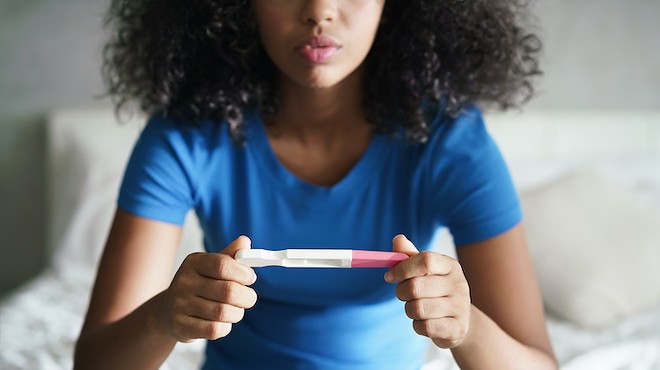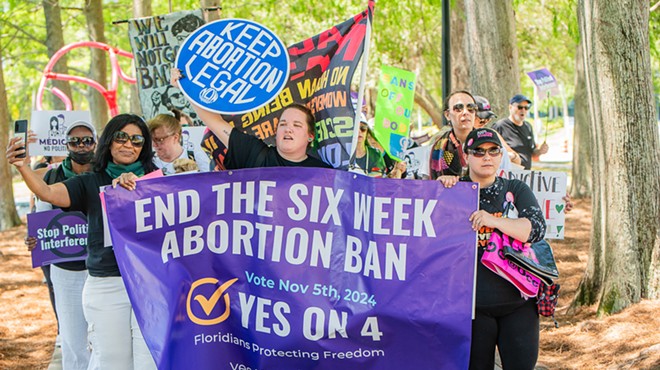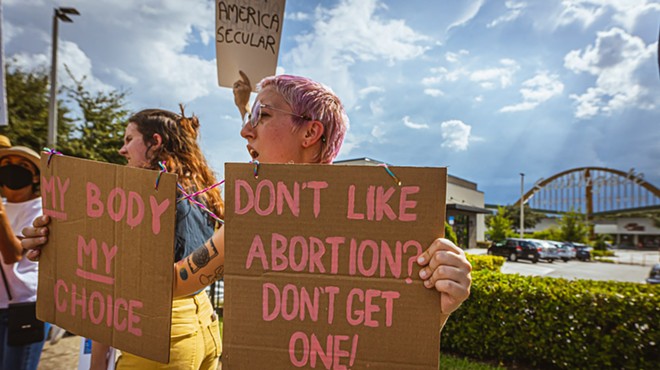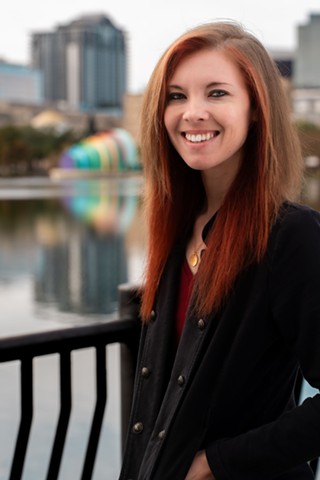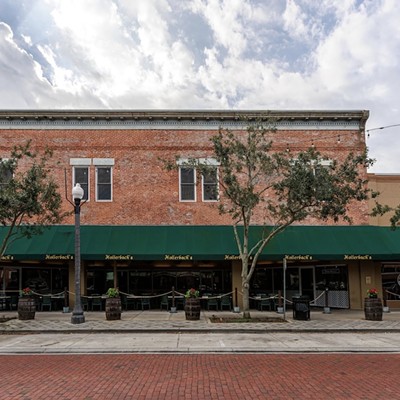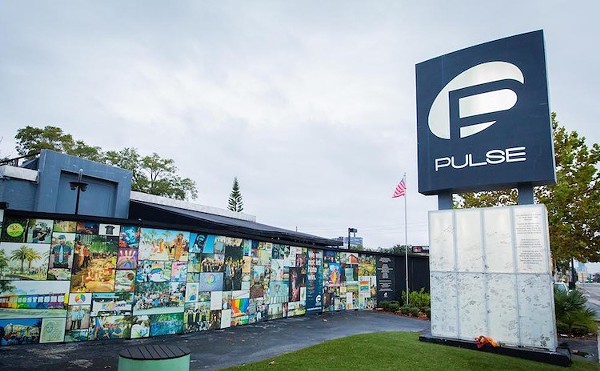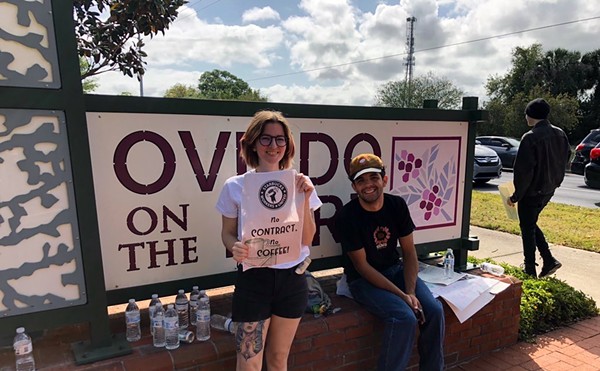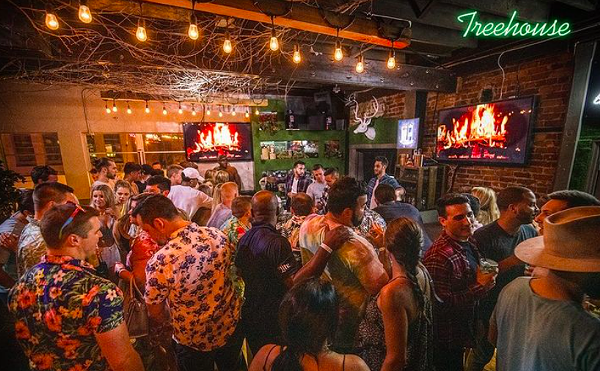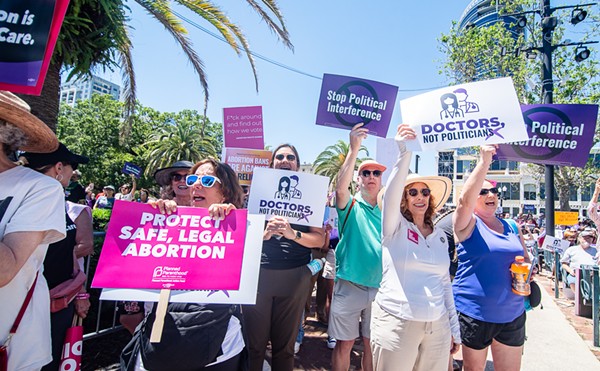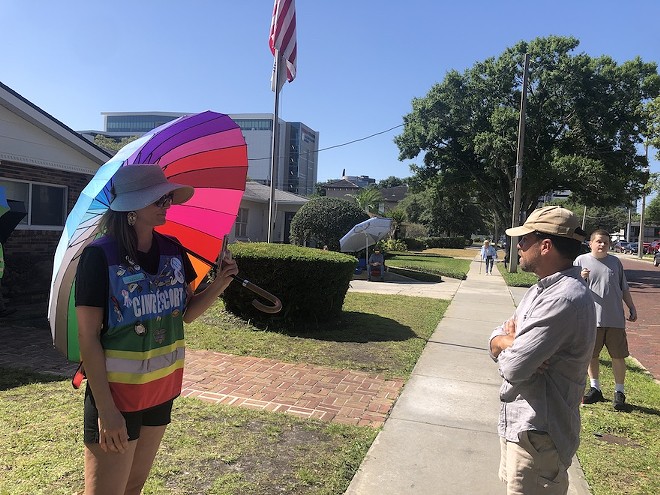
It’s 10 a.m. on a Wednesday morning and already 80 degrees outside. It’s May 1, 2024, which for some, is celebrated as International Workers’ Day. In Florida, it’s also the day that a six-week abortion ban, on hold for over a year, finally takes effect.
Outside a private abortion clinic just south of downtown, it’s quiet at first. The first round of patients that the Center of Orlando for Women sees generally arrive and enter the clinic at 9 a.m. More appointments are usually scheduled for early afternoon.
Four men group outside the clinic, standing on the sidewalk or sitting in the shade on the outskirts of the clinic’s property in lawn chairs. They have a large umbrella set up and anti-abortion literature in hand. This literature includes a pamphlet for a nearby crisis pregnancy center that advertises “abortion consultation.”
This so-called crisis pregnancy center, Choices, is not a licensed medical clinic, according to state records. While it does have licensed medical professionals on staff, it does not provide abortion care, and it is religiously affiliated. It offers free services like STD testing and pregnancy tests. The nonprofit’s goal, according to a website they set up for donors, is to “CHANGE abortion in Orlando. Until there are ZERO.”
The Center of Orlando for Women, meanwhile, is one of two licensed abortion clinics in Orlando, and one of 51 across the state of Florida, which has for years remained an access point not only for pregnant Floridians seeking to terminate their pregnancies, but for pregnant people in other neighboring states where abortion care is less accessible.
The Center is visited nearly every day by anti-abortion advocates, who generally balk at the term “protester.” One of them, John Barros — who visited the clinic nearly every weekday for roughly 20 years — passed away on Feb. 15. His death has, if anything, strengthened his allies’ resolve to continue to show up.
Betty, a volunteer clinic escort and abortion rights advocate who formed a group to help stand guard outside of the clinic, says things have been mostly the same lately. She formed the group, Stand With Abortion Now, after the U.S. Supreme Court’s Dobbs decision overturned the federal constitutional right to abortion in 2022.The group raised nearly $200,000 for the clinic last August, after it was issued a hefty fine by the state for violating a separate Florida law that requires patients to attend two appointments with an abortion provider, 24 hours apart, in order to lawfully terminate a pregnancy.
Staff at the Center of Orlando for Women themselves have declined to talk to the press on multiple occasions.
Its founder, James Pendergraft, who no longer owns the clinic, was a controversial guy — reportedly, he would hand out condoms at local nightclubs advertising the clinic and offer $50 off coupons for abortions performed on Sundays. Pendergraft, a Black doctor who grew up in Chapel Hill, N.C., built a reputation back in the day for providing late-term abortions when it was still legal.
“Abortion is a right for women," Pendergraft told Orlando Weekly in 1998, when abortion in Florida was still legal up to 28 weeks of pregnancy. “It is something to be taken seriously. It is a constitutional right.”
About 26 years later, as Orlando Weekly and a news team from Spectrum News 13 are at the clinic reporting on Florida’s newly effective six-week ban, one of the anti-abortion activists picks up a bullhorn.

A young man, sweating in Florida’s 80-degree May 1 morning heat, shouts into a device, describing the clinic as “Hell,” comparing the clinic to concentration camps. “They delight in the death of the innocent,” he projects, his bullhorn directed squarely at the clinic’s doors.
Betty and several other clinic escorts spring into action, turning on a boombox blasting contemporary pop music and using noisemakers such as bells to block out the words.
The clinic sometimes hires off-duty Orlando police officers to park their cruisers outside the clinic to keep an eye on things. But off-duty rates for officers are expensive. On Wednesday, there’s no police cruiser in sight.
TJ, one of the other men sitting outside the clinic in a lawn chair, tells Orlando Weekly that he’s been coming out there for seven years, currently two days a week. He says his mission is to help women “choose life” and “to bring hope in a dark spot.”
“We know there are resources and people that can help them,” he said, a bullhorn plastered with an “Abortion Is Murder” sticker laid out in the grass at his side.
A 2023 analysis by the Economic Policy Institute found that in states with tighter abortion restrictions, including Florida, working families have weaker economic rights and less supportive infrastructure in place.
These states have have lower minimum wages, lower rates of Medicaid expansion, a higher incarceration rate, and fewer unemployed people successfully accessing unemployment insurance.
Winnie, a clinic escort who has a good relationship with staff at the abortion clinic, told Orlando Weekly that the clinic believes it has the resources to remain open at least through the fall. It’s also considering an expansion of its services, to offer mammograms and birth control in addition to abortion procedures.
“It’s obviously devastating,” Winnie said of Florida’s new six-week ban. “But we’re OK,” she added. “We’re going to keep optimistic.”
“It’s obviously devastating. But we’re OK. We’re going to keep optimistic.”
tweet this
Since April 1, abortion clinics across Florida have been in overdrive, preparing for the impact of Florida’s six-week abortion ban. The six-week limit was approved by Florida’s Republican-dominated state Legislature and Gov. Ron DeSantis last April, but was put on hold due to a pending lawsuit over the state’s 15-week abortion ban, approved in 2022.
The lawsuit contended that the 15-week ban violated a right to privacy clause in Florida’s state constitution. While the Florida Supreme Court has historically interpreted that clause to include the right to an abortion, in a decision released April 1 justices reversed that precedent.
The same day that the Florida Supreme Court cleared the way for an abortion rights initiative to be placed on the statewide ballot this November, the high court also set a 30-day timer on the enactment of Florida’s six-week abortion limit.
“It was really a bifurcated, emotional situation,” admitted Barbara Zdravecky, serving as interim CEO of Planned Parenthood of Southwest and Central Florida.
Zdravecky told Orlando Weekly on Tuesday that there are no plans in place currently for clinic closures in our region. Her organization, which offers other medical, community, and educational services in addition to abortion care, oversees nine health centers, including a Planned Parenthood center in Orlando and one in Kissimmee.
That crisis pregnancy center Choices plans to open a new anti-abortion facility of its own within a mile of the Kissimmee Planned Parenthood next month.
Planned Parenthood staff are also trying to assist patients in figuring out where they can go if they’re too far along to legally terminate their pregnancy in Florida.
There's a legal helpline at reprolegalhelpline.org and information on PlanCPills.org for how to access abortion medication. Abortion funds like the Florida Access Network and Tampa Bay Abortion Fund have also sought to help pregnant people access financial assistance to both obtain and travel for abortion care out of state.
The Tampa Bay Abortion Fund, which assisted more than 2,600 people last year, announced earlier this week they’ve had to close their phone lines, but can still provide funding assistance through partnerships with clinics in the Tampa Bay region.
Outside of Florida, the closest state for a pregnant person to access abortion care is North Carolina, where abortion is legal up to 12 weeks of pregnancy, or Virginia, where it’s legal for the first two trimesters.
Under Florida’s new six-week abortion law, there’s an exception for survivors of rape, incest or human trafficking, allowing them to access abortion until 15 weeks of pregnancy. But there’s a catch. To do so, the law mandates the person provide a copy of a restraining order, a police report, medical records or other documentation at their appointment with an abortion provider.
“Doctors strongly oppose this nearly total ban on abortion and are gravely concerned about the impact it will have on our patients’ freedom, health, and very lives,” Dr. Chelsea Daniels, a Miami family medicine physician, abortion provider, and member of the national Committee to Protect Health Care’s Reproductive Freedom Taskforce said in a statement Wednesday.
“Like most Floridians, we don’t want government interfering in personal medical decisions,” Daniels continued. “When these private decisions are made by politicians instead of patients and their doctors, patients’ lives are put on the line.”
Florida state Democrats have blamed Florida’s six-week ban on Republican politicians like former President Donald Trump — who’s now running for a second term in office — and Gov. Ron DeSantis.
Nikki Fried, head of the Florida Democratic Party, said in a statement Wednesday that Trump “cleared the way for the Supreme Court to overturn Roe v. Wade,” thus “creating a nationwide health care crisis that has already put women’s lives at risk and taken away fundamental rights from millions of women in Florida and across the country.”
Zdravecky, with Planned Parenthood, said they’ve reduced the cost of birth control through their clinics to $9 and are working with others in the community to make emergency contraception more accessible, especially for younger people.
“This is a new situation, a tragic situation for our staff to be in, who are used to taking care of our patients as they present themselves,” said Zdravecky. “Turning folks away is not something that we are accustomed to.”
TJ, the anti-abortion guy sitting outside the Orlando abortion clinic on Wednesday, said he personally wasn't satisfied with the six-week abortion limit, and doesn't identify himself with the wing of the “pro-life movement” that is.
“I think there's value and worth in everyone completely, and so I don't ever believe that there's a point in time where we should be able to say that we are more superior than these human beings.”
Human beings, in his view, include bundles of cells, embryos and fetuses that are not human beings for quite some time throughout the stages of pregnancy, according to, well, science.
In 2023, more than 84,000 people terminated a pregnancy in Florida, according to state data. And according to the Guttmacher Institute, roughly 9,000 traveled to Florida for an abortion from out of state.
Strict abortion bans now cover the Southeast region of the U.S, Florida included.
Abortion rights advocates, however, have hope for a constitutional amendment — Amendment 4 — that will appear on the statewide ballot this November, which could enshrine the right to an abortion up to fetal viability — which is roughly 24 to 28 weeks of pregnancy.
“As this cruel, dangerous ban takes effect today, it’s more important than ever that we pass Amendment 4 to prevent this and future government interference with abortion and reproductive health care,” said Dr. Mona Mangat, a St. Petersburg immunologist who sits as Board Chair of the Committee to Protect Health Care, a national mobilization of healthcare professionals and health advocates.
“There is simply no reason for politicians to be making decisions for patients and doctors, or prosecuting doctors just for providing routine medical care,” Mangat continued. “By voting Yes on 4 in November, we can put decisions around abortion back where they belong: In the hands of Florida families and doctors, not extreme politicians.”
Follow us: Apple News | Google News | NewsBreak | Reddit | Instagram | Facebook | Twitter | or sign up for our RSS Feed

